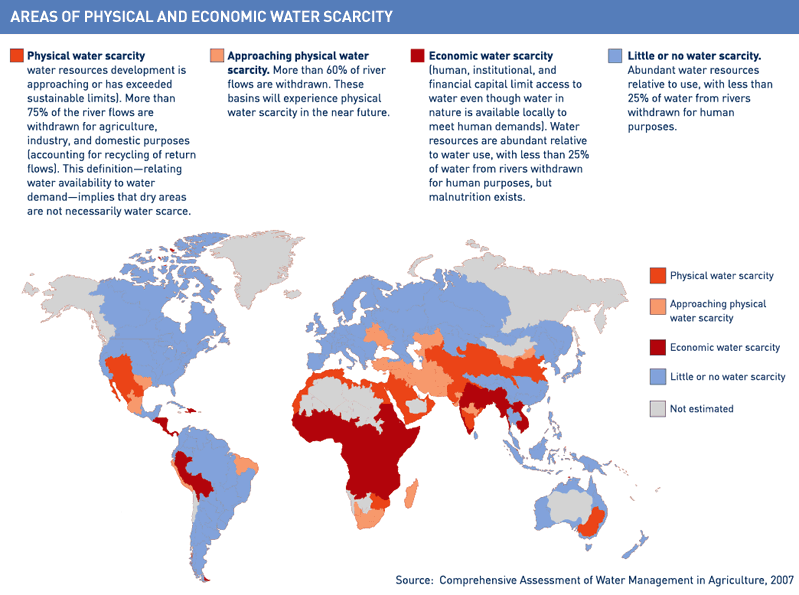WATER: HUMANITY's MOST PRESSING CHALLENGE.
Water scarcity is among the main problems to be faced by many societies and the World in the 21st century. Imbalances between availability and demand, the degradation of groundwater and surface water quality, intersectoral competition, interregional and international conflicts, all bring water issues to the fore. Water scarcity already affects every continent. Freshwater bodies have a limited capacity to process the pollutant charges of the effluents from expanding urban, industrial and agricultural uses.
Water quality degradation can be a major cause of water scarcity. Water stress is also caused by pollution from increasing amounts of wastewater from expanding cities, much of it only partially treated, and from the contamination of aquifers from various sources. This pollution causes eutrophication of surface water and hypoxia (oxygen depletion) in estuaries and coastal waters, causing harm to fisheries and other aquatic life and negatively impacting ecosystem integrity. Such water pollution makes scarcity worse by reducing the amount of freshwater that is safe to use. Water scarcity has heavy economic, social and political costs.
Water quality degradation can be a major cause of water scarcity. Water stress is also caused by pollution from increasing amounts of wastewater from expanding cities, much of it only partially treated, and from the contamination of aquifers from various sources. This pollution causes eutrophication of surface water and hypoxia (oxygen depletion) in estuaries and coastal waters, causing harm to fisheries and other aquatic life and negatively impacting ecosystem integrity. Such water pollution makes scarcity worse by reducing the amount of freshwater that is safe to use. Water scarcity has heavy economic, social and political costs.
- Around 700 million people in 43 countries suffer today from water scarcity.
- By 2025, 1.8 billion people will be living in countries or regions with absolute water scarcity, and two-thirds of the world's population could be living under water stressed conditions.
- The cost of water crisis management in California is estimated to be US$1.6 billion annually by 2020.
- The emergency overhaul of Australia’s water supply regime, triggered by the 2007 drought but resulting from a longer period of imbalance between supply and demand, is expected to cost US$ 10 billion.
WATER DESALINATION
Oceans cover 70 % of the earth’s surface and these contain 97 % of the total water supply on earth. However, this is all salt water. Only 2.5 % of the water supply on earth is fresh water. According to World Bank, even if all viable demand and supply management measures are implemented in the MENA region, the total cost of closing the water demand gap will be approximately US$104 billion per year. This cost easily could go as high as US$300 billion–400 billion a year if none of the demand management options is adopted. Desalination will continue to play a critical role in future water supply portfolio for MENA and certain other parts of the world. Reducing the cost of desalination, eliminating its reliance on fossil fuel, and mitigating its environmental impacts are crucial. Combining renewable energy with desalination can help alleviate the energy costs and environmental impact.
WASTE WATER TREATMENT
Recycling water can potentially offer a “triple dividend” - to urban users, farmers and the environment.The major benefit in most cases is likely to be the value of the fresh water exchanged for high-value urban or industrial use. This would lessen the cost for municipal authorities of seeking their supplies through more expensive means. In addition, reuse prevents untreated wastewater discharge to coastal and groundwater systems with ecosystem benefits. There could also be benefits to farmers if they can avoid some of the costs of extracting and pumping groundwater, while the nutrient present in the wastewater could save some of the expense of fertilizer. Local environmental pollution tax policy and corporate CSR initiatives tilt the balance in favor of waste water treatment. Recycling water is a proven option for bringing supply and demand into a better balance. It is not the only option, but in many cases it is an acceptable and cost effective solution.


